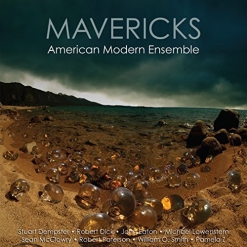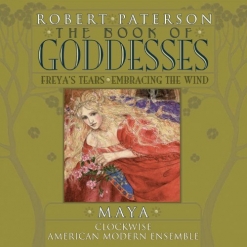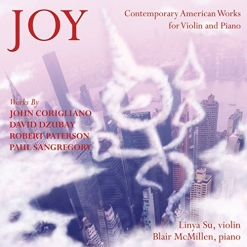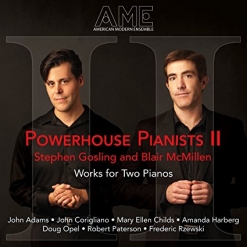
Mavericks
American Modern Ensemble and Robert Paterson
2015 / American Modern Recordings
78 minutes
Review by Kathy Parsons
Mavericks is a collection of ten modern classical recordings from the group of composer/musicians known as American Modern Ensemble. The seven artists featured on the album are some of the “most innovative composer-performers in the United States: musicians who have dedicated their lives to thinking outside the box and inventing new ways to perform their instruments, often using cutting-edge technology, exotic, non-traditional playing techniques and inventive musical notation.” (quoted from the liner notes) The compilation consists of live performances, re-recorded versions, and reissues of pre-existing recordings. The music itself is incredibly varied and always fascinating, but this is “serious” music (even though some of it is rather whimsical) that is not intended for casual listening or for use as “sonic wallpaper.” I found a few tracks rather difficult and discordant, but if you are up to the challenge and interested in the world of modern classical music, this album should be a great adventure!
Mavericks begins with “Spasm,” a piece for bass clarinet and electronics by Michael Lowenstern. Very rhythmic with a driving bass pattern created with a method called “slap-tonguing,” this high-energy piece combines the sophisticated performance and compositional practices of classical music with the power and immediacy of popular music.
“Declaratives in The First Person” from “Timepiece Triptych” by Pamela Z is performed with voice, body synth MIDI controller, processing and electronics. Z sampled her own voice saying: “I would like to think that the art itself would be enough of a statement.” The text was then cut into fragments, compressed, expanded and layered in various combinations. Occasionally the full statement can be heard, but most of the piece is fragments of the sentence or just words, breathing, and other interesting sounds.
“April ’94” by Sean McClowry was the winner of AME’s Second Annual Composition Competition. It was composed for solo bass accompanied by live electronics that are controlled by the performer onstage. The piece recalls the Rwandan massacre of early April 1994 and “deals with catastrophe that distantly occurs simultaneous to everyday life.” I found it interesting that the bass was tuned to middle C, A-flat below, E-flat below, and E below that rather than the traditional tuning of the instrument.
Robert Dick has two pieces on the album. “everyone@universe.existence” is a poem by Marvin Bell presented through music, speech and sound. “Sliding Life Blues” features Dick’s invention, the Glissando Headjoint®, that allows the flute player to slide between notes and play quarter tones and smaller intervals with ease. The piece is a celebration of the Western flute and the sounds of the flutes of Africa and the Middle East.
Robert Paterson provided my two favorite pieces on the album, both performed with six mallets on his five-octave marimba. Paterson has become one of my favorite modern classical composers because his music is distinctive, innovative and experimental yet very accessible and enjoyable to listen to. The first piece is “Komodo,” which was inspired by the Komodo Dragons and the rich marine environment of the ocean that surrounds the island of Komodo. Magical and slightly mysterious, the piece has a playful feeling that evokes all sorts of colorful images. “Piranha” is Paterson’s second composition and is a great companion piece to “Komodo” with its water themes, mystery, and nasty (yet whimsical) little critters. it is also very visual.
“Microtonal Fantasy” by John Eaton requires the performer to sit at two pianos that are placed at right angles and tuned a quarter-tone apart. It’s an interesting idea, but as a person who is fanatical about keeping my piano in tune, this one is a little painful.
“Sumi-E” is a six-movement work that was composed by William O. Smith for clarinet and computer-transformed sounds. Each movement has a a short unaccompanied introduction that displays a different aspect of the clarinet. Again, interesting, but not my cup of tea.
“Matthew, Can You Sperry Me Again?” is a trombone solo by Stuart Dempster performed live and dedicated to the memory of jazz bassist Matthew Sperry (1968-2003). The entire score is: “Allow Matthew Sperry, and his memory, to process soundly through the performer(s).” Being unfamiliar with Matthew Sperry's music makes it difficult to comment, but I appreciate the concept.
Mavericks is a unique and intriguing listening experience! It is available from Amazon, iTunes and AmericanModernRecordings.com.
June 10, 2017

2011
(contributing artist)

with Blair McMillen
2016
(contributing artist)

with Blair McMillen
2015
(contributing artist)

